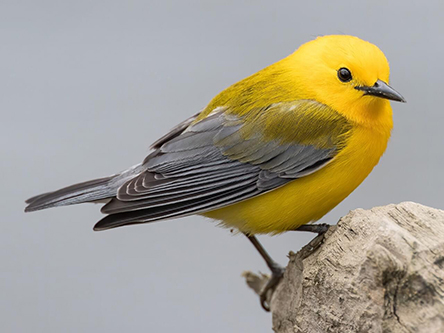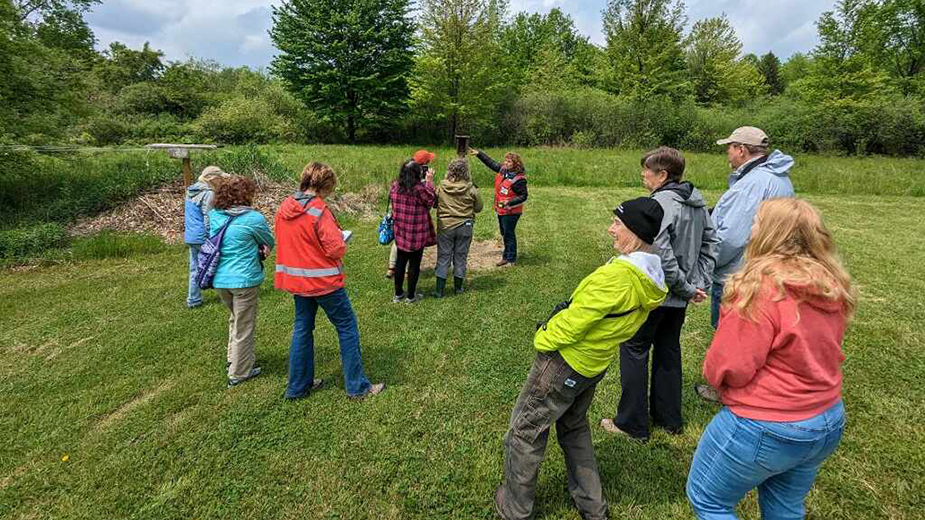CORTLAND – A different type of tourist will soon be flocking to Trumbull County.
Well over a thousand bird watchers from near and far will descend on Mosquito Lake State Park May 17-19 for Big Birding Weekend.
It’s the second year for the event, which takes advantage of the park’s bird-friendly habitat, and its location on the flight path of multiple migratory species heading north from South and Central America to their breeding grounds in Canada.
The weekend will feature birding walks, educational programs, boating excursions and more.
The avian migration ritual has been going on for millennia. Jason Lee, Mosquito Lake park naturalist and director of Big Birding Weekend, is trying to instill a migratory pattern for birdwatchers as well, in which they head to Trumbull County every May.
His efforts seem to be working.
The inaugural Big Birding Weekend last year drew about 800 people. This year, organizers expect at least twice that many.
Lee says a lot of younger have people taken up the hobby in the last four years, and he attributes it to the Covid pandemic and the invention of birding apps.
“Covid put a jump start on birding,” Lee says. “People couldn’t get out of their house with the kids and the Boy Scouts told them to put up a bird feeder in their yard.”
The naturalist, who is also a science teacher at Howland High School, says he sees more and more teens birding at Mosquito.
“We have a chapter of Ohio Young Birders at the park,” he says. “They are out looking every other day.”
A new app, dubbed Merlin, is also playing a huge role in the growth. The free app includes the audible sound and photos of at least a thousand birds, which is a boon to any birding expedition. The Merlin app is a product of Cornell University, which is a leader in ornithology, and is free to download.
TOURISM DRAW
Beth Carmichael, director of the Trumbull County tourism bureau, recognizes the economic impact of nature tourism – and birding in particular.

“Because birds are active in various weather conditions, these visitors tend to stay longer, spend more money at the destination, and travel throughout the year,” she points out.
“Many of our residents are now learning that Mosquito Lake is a prime birding location because of its habitat and location on the migratory path,” Carmichael adds. “It is home to one of the largest bald eagle populations in Ohio. And in May, the prothonotary warblers migrate to the lake from Colombia, which is over 3,000 miles away.”
Warblers are small and colorful migratory birds that are especially loved by birders.
Mosquito also hosts a population of osprey, a large fish-eating bird of prey.
The park’s large campground last week was approaching capacity for Big Birding Weekend. Attendees come from multiple states and countries. They also book hotel rooms and rental homes, and frequent restaurants and other local businesses.
LOCAL EXPERT
Larry Richardson of Bristol is a longtime local birding expert and instructor, who will lead classes and tours during Big Birding Weekend.
To illustrate the advantageous location of Mosquito Lake State Park, he cites an incredible bird count statistic.
“A few nights ago, there were 1,069,000 [migratory] birds that flew over Trumbull County from south to north,” Richardson says. “The numbers are astronomical.”
The birds keep west of the Appalachian Mountains and pause at the Magee Marsh wildlife area near Oak Harbor, Ohio, on the shore of Lake Erie, not far from Toledo. There, they rest and fatten up on insects and prepare for the long flight over the lake.
The migration repeats itself in reverse in the fall, as the birds go south for the winter. To learn more, Richardson recommends Cornell University’s ebird.com site.
The flip side of birding is conservation and other environmental concerns. Richardson wants birders to be aware of worrisome changes.

Birds are a bellwether of global warming and other planetary conditions, he says, and changes in their behavior should be a call to action.
“There are things we can do to merge recreation and conservation,” Richardson says.
“We are losing some bird species and don’t know why. But the birds will tell you everything you need to know about changing habitat.”
NORTHWESTERN OHIO EVENT
One of the biggest birdwatching gatherings in the country is Biggest Week in American Birding, a 10-day event that takes place every May in the Oak Harbor, Ohio, area. The annual event attracted more than 90,000 people last year. This year’s event will be May 3-12.
Kim Kaufman is the director of BWIAB and is also acting as a consultant to Mosquito Lake’s Lee for Big Birding Weekend. She is married to Kenn Kaufman, the renowned artist, naturalist and conservationist and author of several field guides for birds and butterflies.
Kim Kaufman says Mosquito’s birding weekend is an opportunity for the region.
“It has tremendous potential,” she says. “It takes a driving force. I have been that driver [for Biggest Week in American Birding] in northwest Ohio, and I see [the same drive] in Jason Lee.”
BWIAB was launched in 2010. It’s economic impact on northwest Ohio was estimated at $40 million several years ago, and has since far surpassed that figure, Kaufman says.
Guests stay up to two weeks, with some staying a month, she says, but notes that it’s unlikely the Mosquito event will ever grow that large. Northwestern Ohio and its lakeshore has a more favorable habitat for migratory birds and a larger tourism infrastructure, she says.
The migratory birds are mentally hardwired from birth to know the exact flight path to their breeding grounds, including lakes and other landmarks and stopping points along the way.
It’s an amazing but little-known natural phenomenon.
“There is a migration of thousands of miles happening over our heads and nobody even knows it,” Kaufman says.
She and her husband run the Black Swamp bird observatory near Oak Harbor, a scientific organization that has been studying bird migration in northern Ohio for 30 years.
The observatory has been keeping data on the migratory patterns for that long, and Kaufman is worried about what she is seeing.
“The warming is getting things out of kilter,” she says. Insect hatching in northwestern Ohio is happening earlier, which could affect the birds’ feeding frenzy as they pause before crossing Lake Erie.
Also, some bird species begin their migration in reaction to temperatures. Global warming could cause them to begin their journey sooner, which could diminish their survival chances.
Kaufman also wants to sound the alarm about constructing wind turbines on the birds’ flight path along the shores of Lake Erie.
While wind power is an environmentally friendly form of renewable energy, the placement of the turbines must be taken into consideration.
Migratory birds fly at night and could be wiped out in massive numbers if they fly through a windmill farm, she says.
“A good percentage of the world’s population of certain migratory birds could pass right through them [and die],” she warns.
To learn more about Big Birding Weekend, including classes and programs, go to www.tinyurl.com/lakeprograms and click on Big Birding Weekend.
Pictured at top: A birding expedition led by a Big Birding Weekend guide last year.
